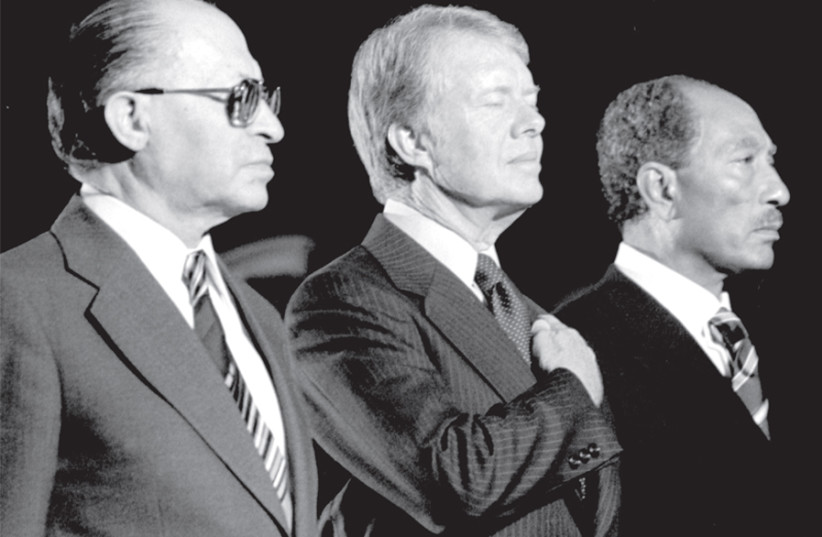For 50 years, Israeli leftists and many in the international community portrayed Jews who moved to eastern Jerusalem, Judea and Samaria (the West Bank) and Gush Katif in the Gaza Strip (until Israel’s withdrawal from the Strip in 2005) as criminals, violating international law, and immorally building communities on land captured in 1967 by the IDF, which Palestinians claim as the basis of a state dedicated to destroying Israel.
Supported by the international community, they assert that Israel is occupying Palestinian territory, which is not limited to the areas which the IDF conquered in the 1967 Six Day War, for many Arabs, it’s everything from the river to the sea. That is what Palestinianism means.
Following the 1967 war, Jewish communities were built on uninhabited state land, often in places where Jewish communities had existed before 1948, such as those in Gush Etzion, south of Jerusalem. No Arabs were evicted or displaced as a result of the 1967 war; in fact, they flourished under Israeli rule.
To distinguish between Jews who lived within the Armistice Lines of 1949 and those who lived beyond those lines, the latter were called settlers and their communities were called settlements. This distinction became explicit when the International Committee of the Red Cross (ICRC), the official interpreter of the Fourth Geneva Convention (FGC), defined the conquered area as occupied Palestinian territory (OPT). Although Jordan conquered and occupied Judea and Samaria, and Egypt occupied the Gaza Strip in 1948, their claims were rejected by the international community. The term settlers was used in order to create the impression that Jews had no right to live there and to dispute their claims of rightful, legal ownership.
Under US president Jimmy Carter (1977-81), the left-wing media, Arab and Muslim countries, and the international community called settlements obstacles to peace, and its residents, Jewish extremists and settler colonialists in order to vilify them. Opposition to settlement expansion became the official policy of many countries, especially after the Oslo Accords of the 1990s and the expulsion of Jews from Gush Katif during the following decade. It became the basis for the two-state solution, involving a Palestinian state run by the PLO, Hamas and other terrorist organizations.

Recently, as Arab attacks on Jewish communities in Judea and Samaria have increased and Jews have responded, sometimes by necessity and forcefully, the Israeli Left promoted the term settler violence as a way of vilifying all Jews who live in Judea and Samaria by equating settlers with violence. It’s a psycho-linguistic trick, often used in advertising, and it works.
Finally, a perspective: Usually the people who scream about settler violence are the same people who oppose Jewish communities that were built beyond the 1949 lines. They also ignore Arab and Bedouin violence, and widespread arson and thefts, especially in rural areas. They ignore clan, tribal and gang warfare among Arabs and Bedouin, polygamy and child abuse as part of their culture. Although true, excusing it does not justify it.
The Arab-Israeli conflict is not over territory, the settlements, it is about Islamist theology and the ideology of Arab nationalism, which denies any Jewish presence in Israel, the homeland of the Jewish people. This explains why the Oslo Accords failed, instead, encouraging more terrorism. Land for peace was only a gimmick. The goal of a Palestinian state, by their meaning, is to eliminate Israel.
In response, supporters of Israel can promote a positive meaning to the term settler as Settler Zionism. This emphasizes the historical connection between the Jewish people and the land of Israel, and the fact that every Jew who lives in Israel is a settler, whether immigrant or native-born. It is confirmation that a Jewish nation-state of the Jewish people is legally and morally legitimate. This is challenged as a form of racism and apartheid, and that Israel has no right to exist.
Settling Eretz Yisrael (yishuv haaretz) has been part of our history since the time of Joshua. It is a Torah commandment. It was the basis for the First and Second Jewish Commonwealths, and prior to 1948, settlers were called pioneers, who enabled the establishment of the state of Israel.
Settler Zionism is integrally apart of the core of Jewish national identity. Moreover, Settler Zionism is not just political, but seeks to create a Jewish culture and society. Settler Zionism is the essence of the role of the Jewish people in history, of Jewish consciousness and the affirmation of God’s presence in the world.
The author is a PhD historian and journalist in Israel.
